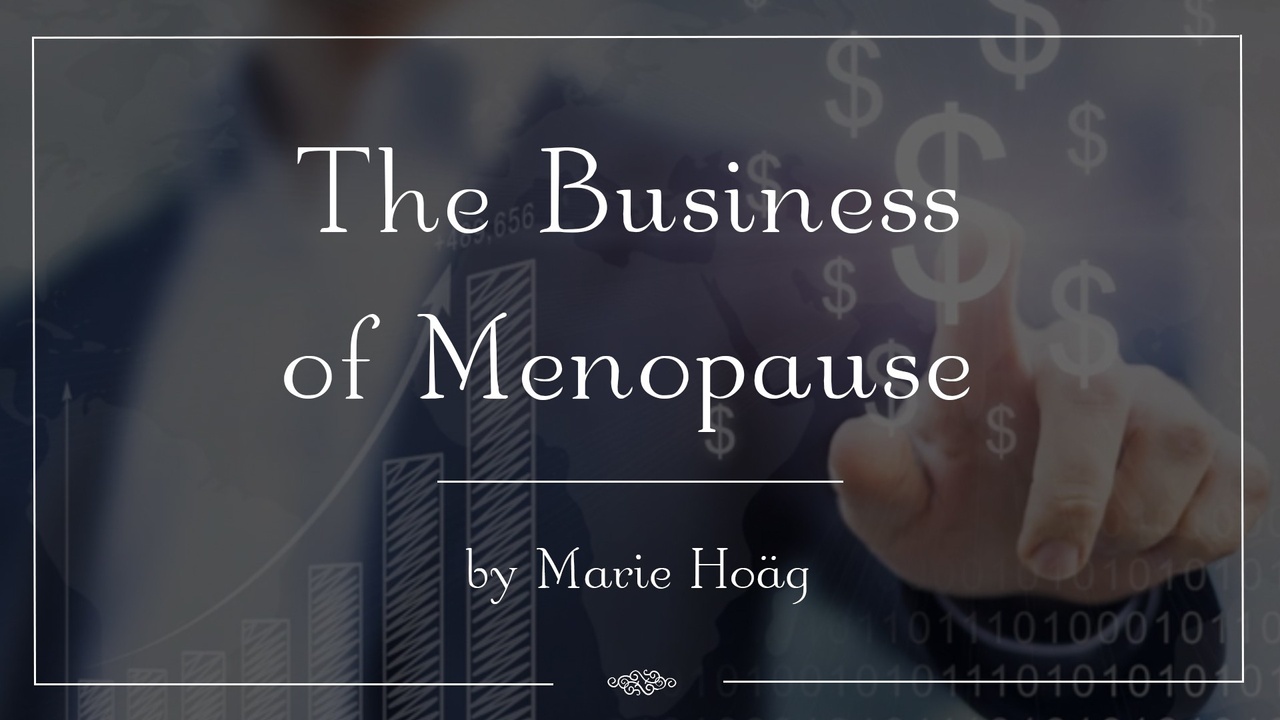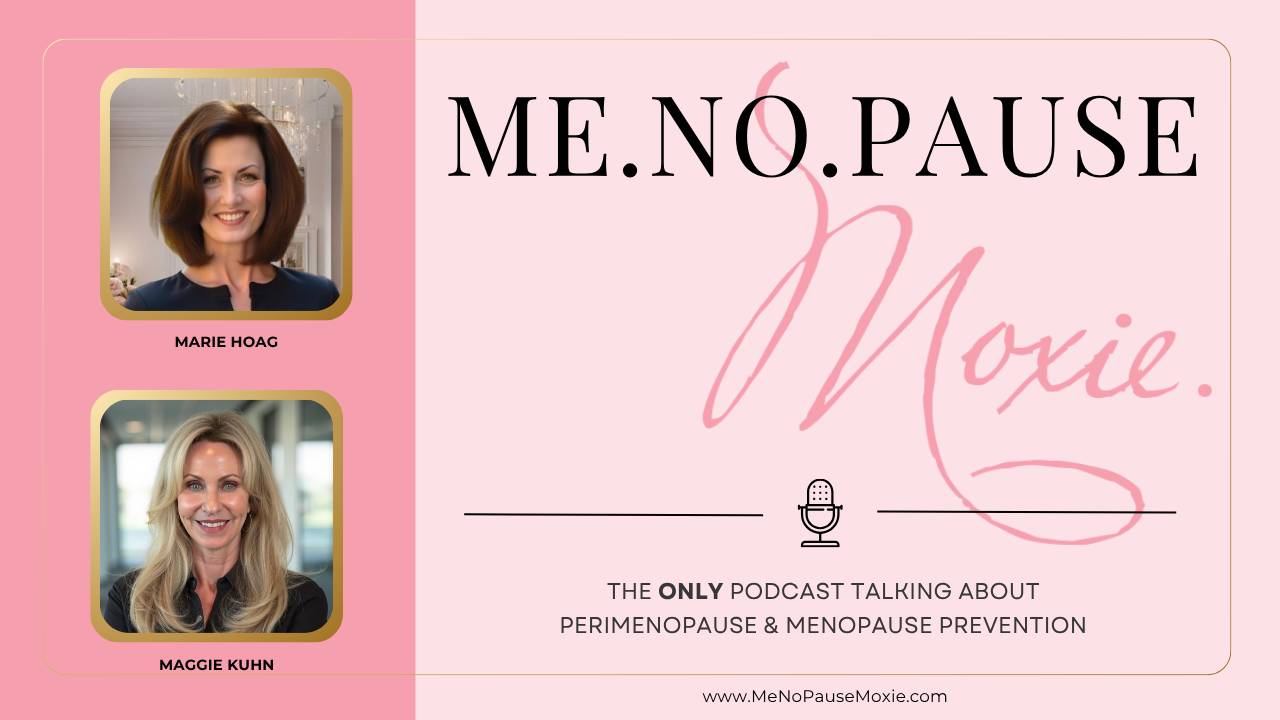The Business of Menopause

The Business of Menopause
According to a report by the venture capital firm Female Founders Fund, there is a $600 billion opening for the business of menopause but I think it is more than that. The report stated that based on an average of $2,000 a year that the 1 billion women expected to be in menopause worldwide by 2025 spend on prescriptions, doctor visits, treatments, devices, and products to address symptoms like night sweats, loss of libido, fatigue, and difficulty concentrating. I believe the $2,000 figure is on the low end. Many female patients in the hormone clinic have shared that they have spent $10,000-$15,000 in the last year alone in search of the right hormone doctor and the right hormone replacement therapy system just to help relieve their symptoms of menopause.
The conditions of menopause are many, and each condition has its own set of side effects. Though there are hundreds of conditions of menopause, these are the top ten complaints I have heard in the hormone clinic over the past 20 years from several thousand women:
- Vasomotor symptoms (hot flashes and night sweats) 75%
- Depression 85%
- Anxiety 85%
- Weight gain 76%
- Insomnia 75%
- Low energy 85%
- Mood swings 60%
- Malcontent 80%
- Brain fog 80%
- Low executive function 70%
Having one of these conditions is miserable enough but most women experience all of these to various degrees in menopause. Women who experience these conditions do not feel good mentally or physically which significantly reduces their quality of life. They have a difficult time in society, with their families, and in their work lives. It is not easy to be a productive woman, employee, or loving wife and mother if you feel cruddy most of the time. The conventional medicine approach to addressing these conditions is to manage the symptoms by way of prescribing drugs and low-dose hormone treatments, selling devices and supplements, and performing surgeries and procedures.
What is menopause?
Many women believe that menopause is something a woman is in something she goes through, or a condition she has to experience. But in reality, it is one date in time, an anniversary of not having a menstrual period bleed for 12 consecutive months. Any time beyond this anniversary is considered post-menopause of which there are four stages.
Menopause, a condition or a side effect?
The cause of missing periods links directly to low estrogen levels. Estrogen is a woman’s main sex hormone, the hormone that dictates how all other hormones perform, including how the female brain and body function, and a woman’s ability to ovulate and menstruate.
When estrogen falls too low, women will not be able to ovulate. And since progesterone is mostly produced during ovulation, it too declines when estrogen is deficient. Plenty of estrogen and progesterone are needed for a woman to have a regular and incident-free menstrual cycle and a monthly period bleed. Declining levels of estrogen and progesterone create multiple malfunctions of the brain and body including the malfunction of the menstrual cycle causing periods to sputter out over time. When estrogen finally drops low enough, periods stop for good.
Is menopause preventable or reversible?
There is widespread thought that menopause is a condition women have to experience but the truth is, menopause is just another side effect of estrogen deficiency just like hot flashes and depression, and the many other mental and physical conditions that women are susceptive to when they lose their main sex hormones.
It has been well established that the only time a woman experiences menopause is when her estrogen remains too low for too long. And it can happen at any age. Menopause is occurring in women at younger and younger ages for various reasons that I go into in another post, but the real problem women face is that no one is addressing the root cause of menopause, estrogen deficiency.
Society, and the medical establishment alike, treat menopause as if it is inevitable and everyone just accepts it as such. If menopause were treated as the estrogen and progesterone deficiency condition that it is, then women will not experience it as long as those hormones are maintained at optimal levels.
Menopause isn’t the problem; it is just another side effect of estrogen deficiency just like depression and anxiety.
Who benefits from women needlessly suffering from menopause?
Pharmaceutical Industry—there are millions of drugs a day that are prescribed to women suffering from the side effects of menopause. It is not uncommon for women to be on 6-12 different drugs to manage the symptoms they experience from menopause. If women never experienced menopause, then there would not be a need to prescribe drugs, psychotropic or otherwise, for mental and physical conditions that do not exist when hormones are properly restored.
Mental Health Industry—the majority of side effects women experience in menopause are those of mental illness. In fact, 85% of the mental illnesses women experience no matter how old they are are caused by the same thing that causes menopause, estrogen deficiency.
Technology Industry—there is a growing industry of technology devices and applications that target women suffering from perimenopause and menopause that tend to give the wrong information about menopause keeping women in it. Women are sold products to manage the symptoms they would not have if menopause were addressed at the cause.
Medical Industry—there are billions of dollars to be made from women suffering from menopause by way of doctor's visits and medical procedures, like hysterectomies, that otherwise would not have to happen if menopause were addressed at the root cause.
Insurance Industry—the insurance industry stands to make billions of dollars by way of charging higher premiums in conjunction with controlling what drugs and procedures are prescribed and covered for menopause maintenance.
There is an intertwining web of money-making opportunities for several industries at the expense of women suffering from estrogen deficiency.
What would happen if women never had to experience menopause?
The world would be happier—ask any woman how she feels right now and you will get an answer that reflects one of the top ten conditions of menopause even if the woman is not in menopause. When a woman has enough estrogen, her brain works, and she is happy and feels good most of the time for no real good reason. And when a woman is feeling good and generally happy, then those around her will be better off.
There would be fewer diseases—there is no shortage of data that indicates how much estrogen influences mental and physical disease in women. 80% of the physical diseases women get are related to low estrogen levels and the good news is that most can be reversed and prevented if hormones are properly restored.
There would be less mental illness—it is not easy for a woman with plenty of estrogen to get depressed or have anxiety. In fact, we know a woman is low in estrogen if she has those conditions; they are clinical indicators of low estrogen that tend to go away once estrogen is fully restored. About 85% of the mental illness diagnoses women get are directly related to low estrogen.
Women could work—when women have enough of the right hormones, their brains work, they fall asleep and stay asleep, they have energy, their bodies do not hurt, they have sharp executive function, they have increased self-esteem and self-confidence, and can productively complete tasks. They work better and get along better with others, they are less reactive and their responses are proportionate to the situation at hand. They are dependable and their moods are stable. They are less likely to call in sick for work and are much more productive not only to the company they work for but in society as a whole.
Families have a greater chance of staying together—an unhappy mama is not someone you want to live with. Women without estrogen feel horrible and when someone feels horrible, they tend to be a bit difficult to live with no matter who they are. Women with enough estrogen tend to be more loving, have a greater ability to emotionally connect, and are more maternal, stable, and dependable. When the matriarch of the family feels good most of the time, they tend to run a more loving and calmer environment for the entire household. This allows for a more cohesive and connected family unit.
The Medical Establishment would lose control—one of the best ways to control the mind and body of women is to take away their estrogen. Estrogen deficient women are virtually powerless. When women get their hormones balanced in a way that prevents menopause, then there are very few mental and physical conditions they will have to manage. This takes away control of the Medical Establishment and puts it into the hands of women.
We can change the way menopause is addressed.
Menopause is a big money-making machine for many industries at the expense of women’s suffering that does not need to exist. If menopause were addressed as the estrogen deficiency condition that it is, there would be no menopause nor the need to manage its side effects with expensive products, drugs, and procedures. And women would feel good again or for the first time.
Women have a choice as to whether they experience perimenopause or menopause in their lifetime. The best way to prevent menopause (and perimenopause) is to find someone to help you who understands menopause (and perimenopause) to be the estrogen deficiency condition that it is and further knows how to properly restore your main sex hormones to your Hormone Sweet Spot™ so you may never have to experience estrogen deficiency or its side effect of menopause for as long as you choose.
If it feels like everyone you are going to for menopausal help is just managing your menopausal symptoms with drugs and low dose hormone therapies, I encourage you to take a look at one of my hormone-balancing programs to see if one may be a good fit. I can help you get your hormones balanced and keep them balanced so you may never have to experience menopause or its side effects.
The best way for you to take control of your mind and body is to get your hormones balanced and keep them balanced.

Reference:
Albert K, Pruessner J, Newhouse P. Estradiol levels modulate brain activity and negative responses to psychosocial stress across the menstrual cycle. Psychoneuroendocrinology. 2015;59:14-24.
Jordan VC. The new biology of estrogen-induced apoptosis applied to treat and prevent breast cancer. Endocr Relat Cancer. 2015;22(1):R1-31.
Krajewski-hall SJ, Blackmore EM, Mcminn JR, Rance NE. Estradiol alters body temperature regulation in the female mouse. Temperature (Austin). 2018;5(1):56-69.
Krolick KN, Zhu Q, Shi H. Effects of Estrogens on Central Nervous System Neurotransmission: Implications for Sex Differences in Mental Disorders. Prog Mol Biol Transl Sci. 2018;160:105-171.
Leeners B, Geary N, Tobler PN, Asarian L. Ovarian hormones and obesity. Hum Reprod Update. 2017;23(3):300-321.
Masters WH. Sex steroid influence on the aging process. Am J Obstet Gynecol. 1957;74(4):733-42.
Pengo MF, Won CH, Bourjeily G. Sleep in Women Across the Life Span. Chest. 2018 Jul;154(1):196-206.
Reiss, MD, Uzzi, Fitzpatrick B. The Good News About Estrogen, The Truth Behind a Powerhouse Hormone. St. Martin's Press; 2020.
Roshenshein B. Preventing Menopause, Stopping Ovarian Failure Before It Starts. 2013.
Studd J, Panay N. Hormones and depression in women. Climacteric. 2004 Dec;7(4):338-46.
ter Horst GJ. Estrogen in the limbic system. Vitam Horm. 2010;82:319-38.
Wilson RA, Wilson TA. The fate of the non-treated postmenopausal woman: a plea for the maintenance of adequate estrogen from puberty to the grave. J Am Geriatr Soc. 1963;11:347-62.

Stay connected with me.
Join my mailing list to receive the latest news and updates on blog posts, new podcast episodes, in-person and online events, appearances, webinars, and programs.







